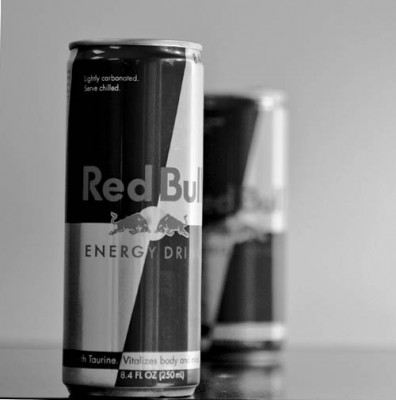
Red Bull gives you wings.
At least that’s what the commercials say. As endorsed by celebrity sponsors Rickie Fowler, Sebastian Vettel and Travis Rice, who support the effects caused by the controversial drink, it gives you the energy to succeed.
George Mason University athletes, however, are well aware of the risks that come with drinking Red Bull and other energy drinks.
The most common and popular stimulant found in energy drinks is caffeine, but most drinks also contain other harmful energy-inducing ingredients that can cause a variety of negative nutritional, physical and psychological effects.
According to Theresa Logan, the sports dietitian for the Center for Sports Performance at Mason, the ingredients in energy drinks stimulate the central nervous system, increase mental acuity, blood pressure and heart rate, as well as cause dental erosion and dehydration.
“For a student athlete, consuming energy drinks throughout the day creates a jittery feeling, upset stomach and insomnia,” Logan said. “This situation cascades into poor diet and sleep habits and sudden energy crashes.”
On average, a student athlete can lose approximately three liters of fluid per day through exercise, and by adding energy drinks to their daily diet, they put themselves at risk for dehydration, over exertion, fatigue and poor performance, Logan said.
The NCAA bans some stimulants found in energy drinks, but has not yet banned caffeine intake in small quantities. Caffeine is on its restricted substance list, meaning that the NCAA does set a limit on student athlete intake. Believe it or not, the amount of caffeine in an 8-ounce can of Red Bull is similar to that of a small cup of coffee. Caffeine metabolism and excretion vary with an athlete’s size, so having a cup of coffee in the morning or afternoon may or may not show negative effects depending on the individual.
None of the Mason sports teams have any bans on the consumption of energy drinks, but the student athletes are educated on health effects that result from consuming them. The Center for Sports Performance gives nutritional presentations every preseason to all of the athletes and coaches, educating them on what they should and shouldn’t be consuming, including permissible sports drinks and energy bars.
Along with the collegiate level, both high school and professional programs have taken initiatives against energy drinks. Many state high school leagues especially discourage their consumption, and some, such as the Virginia High School League, have even banned them. In the professional ranks, both the Arizona Diamondbacks and Houston Astros no longer provide energy drinks to their players and continue efforts to discourage them from drinking energy drinks on their own.
Logan says water is the best way to hydrate for most types of activity; and for more intense exercise, sports drinks such as Gatorade and Powerade work great. If you do need a quick and easy way to energize yourself late in the day, Logan suggests trying to drink a 12-ounce cup of coffee with two or three pieces of dark chocolate. Current research supports the use of dark chocolate for cardiovascular health and exercise recovery.
At the end of the day, Mason student athletes are given all of the proper tools and information they need to maximize their performance and maintain great health. It’s important to remember that energy doesn’t come in a bottle.






Comments